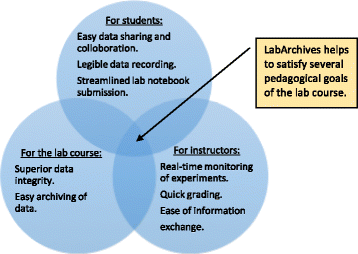Difference between revisions of "Template:Article of the week"
Shawndouglas (talk | contribs) (Updated article of the week text.) |
Shawndouglas (talk | contribs) (Updated article of the week text) |
||
| Line 1: | Line 1: | ||
<div style="float: left; margin: 0.5em 0.9em 0.4em 0em;">[[File:Fig1 | <div style="float: left; margin: 0.5em 0.9em 0.4em 0em;">[[File:Fig1 Riley JOfBioEng2017 11.gif|240px]]</div> | ||
'''"[[ | '''"[[Implementation and use of cloud-based electronic lab notebook in a bioprocess engineering teaching laboratory|Implementation and use of cloud-based electronic lab notebook in a bioprocess engineering teaching laboratory]]"''' | ||
[[Electronic laboratory notebook]]s (ELNs) are better equipped than paper [[laboratory notebook]]s (PLNs) to handle present-day life science and engineering experiments that generate large data sets and require high levels of data integrity. But limited training and a lack of workforce with ELN knowledge have restricted the use of ELN in academic and industry research [[Laboratory|laboratories]], which still rely on cumbersome PLNs for record keeping. We used [[LabArchives, LLC|LabArchives]], a cloud-based ELN in our bioprocess engineering lab course to train students in electronic record keeping, good documentation practices (GDPs), and [[data integrity]]. | |||
Implementation of ELN in the bioprocess engineering lab course, an analysis of user experiences, and our development actions to improve ELN training are presented here. ELN improved pedagogy and learning outcomes of the lab course through streamlined workflow, quick data recording and archiving, and enhanced data sharing and collaboration. It also enabled superior data integrity, simplified information exchange, and allowed real-time and remote monitoring of experiments. ('''[[Journal:Implementation and use of cloud-based electronic lab notebook in a bioprocess engineering teaching laboratory|Full article...]]''')<br /> | |||
<br /> | <br /> | ||
''Recently featured'': | ''Recently featured'': | ||
: ▪ [[Journal:An open experimental database for exploring inorganic materials|An open experimental database for exploring inorganic materials]] | |||
: ▪ [[Journal:Broad-scale genetic diversity of Cannabis for forensic applications|Broad-scale genetic diversity of Cannabis for forensic applications]] | : ▪ [[Journal:Broad-scale genetic diversity of Cannabis for forensic applications|Broad-scale genetic diversity of Cannabis for forensic applications]] | ||
: ▪ [[Journal:Arkheia: Data management and communication for open computational neuroscience|Arkheia: Data management and communication for open computational neuroscience]] | : ▪ [[Journal:Arkheia: Data management and communication for open computational neuroscience|Arkheia: Data management and communication for open computational neuroscience]] | ||
Revision as of 15:51, 11 June 2018
Electronic laboratory notebooks (ELNs) are better equipped than paper laboratory notebooks (PLNs) to handle present-day life science and engineering experiments that generate large data sets and require high levels of data integrity. But limited training and a lack of workforce with ELN knowledge have restricted the use of ELN in academic and industry research laboratories, which still rely on cumbersome PLNs for record keeping. We used LabArchives, a cloud-based ELN in our bioprocess engineering lab course to train students in electronic record keeping, good documentation practices (GDPs), and data integrity.
Implementation of ELN in the bioprocess engineering lab course, an analysis of user experiences, and our development actions to improve ELN training are presented here. ELN improved pedagogy and learning outcomes of the lab course through streamlined workflow, quick data recording and archiving, and enhanced data sharing and collaboration. It also enabled superior data integrity, simplified information exchange, and allowed real-time and remote monitoring of experiments. (Full article...)
Recently featured:










